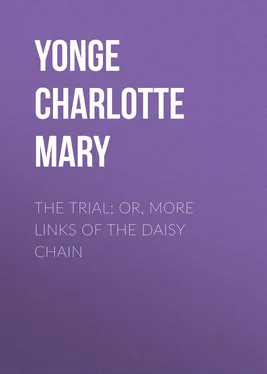Charlotte Yonge - The Trial; Or, More Links of the Daisy Chain
Здесь есть возможность читать онлайн «Charlotte Yonge - The Trial; Or, More Links of the Daisy Chain» — ознакомительный отрывок электронной книги совершенно бесплатно, а после прочтения отрывка купить полную версию. В некоторых случаях можно слушать аудио, скачать через торрент в формате fb2 и присутствует краткое содержание. Жанр: foreign_prose, literature_19, Европейская старинная литература, foreign_antique, на английском языке. Описание произведения, (предисловие) а так же отзывы посетителей доступны на портале библиотеки ЛибКат.
- Название:The Trial; Or, More Links of the Daisy Chain
- Автор:
- Жанр:
- Год:неизвестен
- ISBN:нет данных
- Рейтинг книги:4 / 5. Голосов: 1
-
Избранное:Добавить в избранное
- Отзывы:
-
Ваша оценка:
- 80
- 1
- 2
- 3
- 4
- 5
The Trial; Or, More Links of the Daisy Chain: краткое содержание, описание и аннотация
Предлагаем к чтению аннотацию, описание, краткое содержание или предисловие (зависит от того, что написал сам автор книги «The Trial; Or, More Links of the Daisy Chain»). Если вы не нашли необходимую информацию о книге — напишите в комментариях, мы постараемся отыскать её.
The Trial; Or, More Links of the Daisy Chain — читать онлайн ознакомительный отрывок
Ниже представлен текст книги, разбитый по страницам. Система сохранения места последней прочитанной страницы, позволяет с удобством читать онлайн бесплатно книгу «The Trial; Or, More Links of the Daisy Chain», без необходимости каждый раз заново искать на чём Вы остановились. Поставьте закладку, и сможете в любой момент перейти на страницу, на которой закончили чтение.
Интервал:
Закладка:
After superintending Aubrey's first bath, and duly installing the vice-M. D. and her charges, Dr. Spencer departed; and Ethel was launched on an unknown ocean, as pilot to an untried crew. She had been told to regard Leonard's bashfulness as a rare grace; but it was very inconvenient to have the boy wretchedly drooping, and owning nothing amiss, apparently unacquainted with any English words, except 'Thank you' and 'No, thank you.' Indeed, she doubted whether the shyness were genuine, for stories were afloat of behaviour at Stoneborough parties which savoured of audacity, and she vainly consulted Aubrey whether the cause of his discomfiture were her age or her youth, her tutorship or her plain face. Even Aubrey could not elicit any like or dislike, wish or complaint; and shrugging up his shoulders, decided that it was of no use to bother about it; Leonard would come to his senses in time. He was passive when taken out walking, submissive when planted on a three-cornered camp-stool that expanded from a gouty walking-stick, but seemed so inadequately perched, and made so forlorn a spectacle, that they were forced to put him indoors out of the glare of sea and sky, and hoping that he would condescend to the sofa when Ethel was out of sight.
Punctilio broke down the next morning; and in the midst of breakfast, he was forced to lie down, and allow Ethel to bathe his face with vinegar and water; while she repented of the 'make-the-best-of-it' letter of the yesterday, and sent Aubrey out on a secret commission of inquiry about medical men, in case of need. Aubrey was perfectly well, and in such a state of desultory enjoyment and sea-side active idleness, that he was quite off her mind, only enlivening her morning of nursing by his exits and entrances, to tell of fresh discoveries, or incidents wonderful to the inland mind.
After dinner, which had driven Leonard to lie on his bed, Aubrey persuaded his sister to come to see his greatest prize; a quaint old local naturalist, a seafaring man, with a cottage crammed with pans of live wonders of the deep in water, and shelves of extinct ones, 'done up in stane pies,' not a creature, by sea or land, that had haunted Coombe for a few million of ages, seemed to have escaped him. Such sea-side sojourns as the present, are the prime moments for coquetries with the lighter branches of natural science, and the brother and sister had agreed to avail themselves of the geological facilities of their position, the fascinations of Hugh Miller's autobiography having entirely gained them during Aubrey's convalescence. Ethel tore herself away from the discussion of localities with the old man, who was guide as well as philosopher, boatman as well as naturalist, and returned to her patient, whom she found less feverish, though sadly low and languid.
'I wish I knew what to do for you,' she said, sitting down by him. 'What would your sister do for you?'
'Nothing,' he wearily said, 'I mean, a great deal too much.' The tone so recalled Norman's dejected hopelessness, that she could not help tenderly laying her cold hands on the hot brow, and saying, 'Yes, I know how little one can do as a sister—and the mockery it is to think that one place can ever be taken!'
The brown eyes looked at her with moist earnestness that she could hardly bear, but closed with a look of relief and soothing, as she held her hand on his forehead. Presently, however, he said, 'Don't let me keep you in.'
'I have been out, thank you. I am so glad to try to do anything for you.'
'Thank you. What o'clock is it, please? Ah, then I ought to take that draught! I forgot it in the morning.'
He permitted her to fetch it and pour it out, but as she recognized a powerful tonic, she exclaimed, 'Is this what you are taking? May it not make you feverish?'
'No doubt it does,' he said, lying down again; 'it was only Henry—'
'What! did not my father know of it?'
'Of course he does not, as it seems to be poison.'
'Not exactly that,' said Ethel; 'but I was surprised, for it was talked of for Aubrey; but they said it wanted watching.'
'Just like Henry,' observed Leonard.
'Well,' said Ethel, repressing her indignation, 'I am glad, at least, to find a possible cause for your bad night. We shall see you refreshed to-morrow, and not wishing yourself at home.'
'Don't think that I wish that. Home is gone for ever.'
'Home may be gone higher—up to the real Home,' said Ethel, blushing with the effort at the hint, and coming down to earthlier consolations, 'but even the fragments will grow into home again here, and you will feel very differently.'
Leonard did not answer; but after a pause said, 'Miss May, is not it a horrid pity girls should go to school?'
'I am no judge, Leonard.'
'You see,' said the boy, 'after the little girls were born, my mother had no time for Ave, and sent her to Brighton, and there she begged to stay on one half after another, learning all sorts of things; but only coming home for short holidays, like company, for us to wonder at her and show her about, thinking herself ever so much in advance of my poor mother, and now she knows just nothing at all of her!'
'You cannot tell, Leonard, and I am sure she has been devoted to you.'
'If she had stayed at home like you, she might have known how to let one alone. Oh, you can't think what peace it was yesterday!'
'Was it peace? I feared it was desertion.'
'It is much better to be by oneself, than always worried. To have them always at me to get up my spirits when the house is miserable—'
'Ah,' said Ethel, 'I remember your mother rejoicing that she had not to send you from home, and saying you were always so kind and gentle to her.'
'Did she!' cried the boy, eagerly. 'Oh, but she forgot—' and he hid his face, the features working with anguish.
'So pleased and proud she used to look, walking with you on Saturday afternoons.'
'Those Saturdays! They were the only walks she ever would take; but she would always come with me.'
More followed in the same strain, and Ethel began to gather more distinct impressions of the Ward family. She saw that her present charge was warm and sound-hearted, and that the strength of his affections had been chiefly absorbed by the homely housewifely mother, comparatively little esteemed by the modernized brother and sister. Of the loss of his father he seemed to think less; it seemed, indeed, rather to reconcile him to that of his mother, by the grief it spared her; and it confirmed Ethel's notion, that Mr. Ward, a busy and dull man, paid no great attention to his children between the plaything period and that of full development. The mother was the home; and Averil, though Leonard showed both love for and pride in her, had hitherto been a poor substitute, while as to Henry, there was something in each mention of him which gave Ethel an undefined dread of the future of the young household, and a doubt of the result of her father's kind schemes of patronage.
At any rate, this conversation had the happy effect of banishing constraint, and satisfying Ethel that the let-alone system was kindness, not neglect. She was at ease in discussing fossils, though he contributed no word, and she let him sleep or wake as he best liked; whilst Aubrey read to her the 'Cruise of the Betsey.'
Henry's prescription was sent to invigorate the fishes, when its cessation was found to be followed by the recovery of sleep and appetite, and in the cool of the evening, by a disposition to stroll on the beach, and lie under the lee of a rock upon a railway rug, which Ethel had substituted for the 'three-legged delusion.'
There he was left, while his companions went fossil-hunting, and stayed so long as to excite their compunction, and quicken their steps when they at length detached themselves from the enticing blue lias.
'What has he got there?' cried Aubrey. 'Hillo, old fellow! have you fallen a prey to a black cat?'
Читать дальшеИнтервал:
Закладка:
Похожие книги на «The Trial; Or, More Links of the Daisy Chain»
Представляем Вашему вниманию похожие книги на «The Trial; Or, More Links of the Daisy Chain» списком для выбора. Мы отобрали схожую по названию и смыслу литературу в надежде предоставить читателям больше вариантов отыскать новые, интересные, ещё непрочитанные произведения.
Обсуждение, отзывы о книге «The Trial; Or, More Links of the Daisy Chain» и просто собственные мнения читателей. Оставьте ваши комментарии, напишите, что Вы думаете о произведении, его смысле или главных героях. Укажите что конкретно понравилось, а что нет, и почему Вы так считаете.












